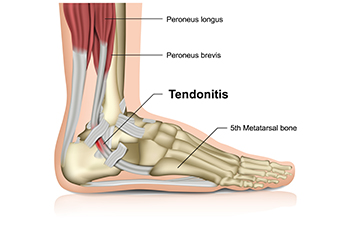Facts About the Achilles Tendon and Potential Injuries
Tuesday, 17 September 2024 00:00
The Achilles tendon, the largest tendon in the body, connects the calf muscles to the heel bone, playing a vital role in walking, running, and jumping by facilitating the movement of the foot. Achilles tendon injuries often result from overuse, excessive strain, or sudden increases in physical activity. Causes include repetitive stress from activities like running or jumping, improper footwear, or muscle imbalances. People prone to these injuries include athletes, especially those involved in sports requiring quick changes in direction, and anyone who suddenly intensifies their exercise routines without proper conditioning. Other risk factors include age-related tendon degeneration and pre-existing conditions like diabetes or arthritis. Achilles tendon injuries can cause severe pain and discomfort. If you have sustained this type of injury, it is suggested that you promptly consult a podiatrist who can effectively treat and manage this condition.
Achilles tendon injuries need immediate attention to avoid future complications. If you have any concerns, contact Dr. Steven Schwartz of Pennsylvania. Our doctor can provide the care you need to keep you pain-free and on your feet.
What Is the Achilles Tendon?
The Achilles tendon is a tendon that connects the lower leg muscles and calf to the heel of the foot. It is the strongest tendon in the human body and is essential for making movement possible. Because this tendon is such an integral part of the body, any injuries to it can create immense difficulties and should immediately be presented to a doctor.
What Are the Symptoms of an Achilles Tendon Injury?
There are various types of injuries that can affect the Achilles tendon. The two most common injuries are Achilles tendinitis and ruptures of the tendon.
Achilles Tendinitis Symptoms
- Inflammation
- Dull to severe pain
- Increased blood flow to the tendon
- Thickening of the tendon
Rupture Symptoms
- Extreme pain and swelling in the foot
- Total immobility
Treatment and Prevention
Achilles tendon injuries are diagnosed by a thorough physical evaluation, which can include an MRI. Treatment involves rest, physical therapy, and in some cases, surgery. However, various preventative measures can be taken to avoid these injuries, such as:
- Thorough stretching of the tendon before and after exercise
- Strengthening exercises like calf raises, squats, leg curls, leg extensions, leg raises, lunges, and leg presses
If you have any questions please feel free to contact our offices located in Chambersburg, and Mcconnellsburg, PA . We offer the newest diagnostic tools and technology to treat your foot and ankle needs.

